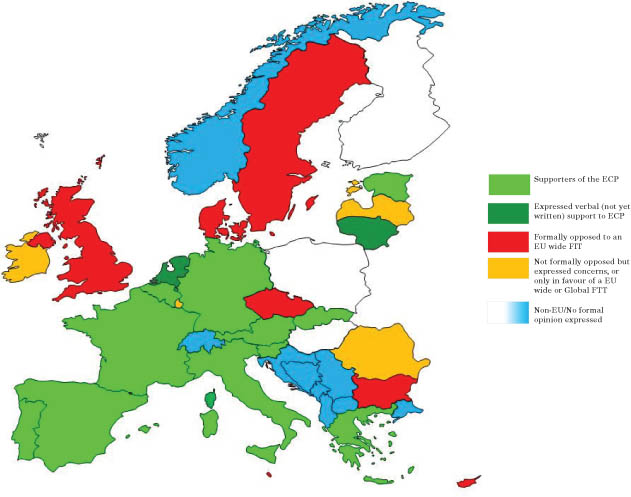Financial Transactions Tax - A Divided Europe
Introduction
On 28 September 2011 the EU Commission released its draft proposal for an EU-wide financial transactions tax (FTT).
Over 15 months on and the various member states have failed to reach an agreement on the finer details with some member states, including Ireland and the UK, continuing to oppose the FTT. As Ireland has taken up its 6th Presidency of the Council of the European Union on 1 January 2013 this article examines the following:
- Background to the FTT
- The draft directive
- Progress to date
- View from the member states
- Implications for Ireland
- Future prospects
Background to the FTT
In the wake of a global financial crisis there has been much debate and speculation among EU think tanks about how the financial services sector could and should be taxed. The FTT is the most recent step in this debate. We have seen similar efforts by the Irish government when they introduced the pension levy. Interestingly this is something that Minister Noonan has indicated will be phased out by 2014.
In October 2010, the Commission published a communication on the relative merit of a FTT. The effect of a FTT would be similar to charging value added tax on financial services: at present most financial services are exempt from VAT. The commission proposes that the tax should come into effect from 1 January 2014.
The Draft Directive
Economic Scope
The FTT would be charged:
- On financial institutions
- In respect of financial transactions
Territorial Scope
The FTT would apply where:
- At least one party is established in a member state: and
- A financial institution established in the territory of a member state is involved in the transaction
unless
- The “economic substance” of the transaction is not linked with the member states
The Charge
Liability
- Where both parties to a transaction are financial institutions, both would have to pay FTT
- Where only one is it would only be subject to a single charge
Rates
The draft directive sets out the minimum rates:
- .01% for derivatives:
- .1% for other transactions.
Compliance
Each member state will be required to;
- Adopt the measures in local law to ensure that the FTT is adhered to, and
- Adopt measures to prevent evasion or avoidance of the FTT
Liability for FTT would fall on each financial institution which was either a party to the transaction (whether for its own account or otherwise) or on whose account the transaction had been carried out.
Any FTT due would have to be paid either;
- When the tax becomes chargeable, in the case of an electronic transaction, or
- Within three working days from when the tax becomes due, in all other cases
Under the draft directive each member state will be required to adopt the provisions of the directive in local legislation. Each member state will be required to ensure that the financial institutions party to the transactions collect the FTT and remit the balance collected to the EU periodically.
Progress to Date (See Diagram)
As with any political hotcake the views expressed from the Member States is continuously evolving due to a number of factors, not least the various changes in the ruling government parties. However, there is a constant theme emerging from the public that a contribution must be obtained from the major financial institutions towards the repair of the worldwide (and more importantly the EU) economy.
The vision of an EU wide implementation of the FTT stalled when a handful of Member States made it clear that they had specific issues with the proposals, making agreement next to impossible. This led to a change in approach in October 2012 when 11 countries indicated they would like to establish a common form of the FTT. Austria, Belgium, Estonia, France, Germany, Greece, Italy, Portugal, Slovakia, Slovenia and Spain, signed up while the Netherlands agreed to partake in discussions subject to certain caveats.
The enhanced co-operation procedure (“ECP”) allows nine or more Member States to move forward on a particular area as a last resort if the EU as a whole cannot reach agreement within a reasonable period. All members of the Council may participate in its deliberations, but only those participating in ECP shall take part in the vote. Other Member States are free to join ECP at any time however, it is worth noting that once a member state signs up it may not then exclude itself in the future.
The above 11 Member States submitted a request to the Commission for a proposal to introduce the FTT via ECP which was approved in November 2012 by the Commission and by the EU Parliament in December 2012. This final hurdle is to obtain formal authorisation from the Council. This would require an EU-27 qualified majority vote (in this case 74% of Member States’ votes are needed, representing 62% of the EU's population) in the Council, after obtaining the consent of the European Parliament. It is now likely that this will be passed based on the countries currently supporting the FTT.
Views from the Member States
There is a substantial body of work required before the FTT is enacted, not least a decision as to where revenue raised will be allocated. The EU Council President Herman Van Rompuy suggested that the FTT revenues should be used to off-set national contributions. This is not the first time EU authorities have laid claim to the proceeds of a FTT. In its budgetary plans for 2014–2020, the EC floated the idea of using a FTT as a source of revenue, to make it less reliant on funds from national governments.
The IMF believes that there are more efficient methods of taxing the financial sector, arguing that backward looking charges on financial instruments based on past balance sheet items is more effective. Many commentators, including the ECB, have warned that the FTT could damage competitiveness of European financial centers unless the scheme is adopted internationally. This is a view that has continuously been echoed by the UK who have continuously insisted that such a tax would have to apply globally to function competitively. The UK vetoed the EU wide FTT on this basis. The British chancellor of the exchequer, George Osborne, insisted the tax could damage the City of London and hurt the wider European economy by encouraging the trade financial transactions to move to countries outside the EU. “I would have thought we want to be attracting business rather than the other way around,” he said. This is a view that has been shared by a number of other jurisdictions including Ireland, Sweden and Malta.
What impact a FTT would have on trading across the EU is unclear; the 11 countries have asked the EU to undertake a detailed impact assessment of the proposals. Other countries, such as the UK and Poland, are also keen to see the results of this assessment. Losing alignment of the single market and creating an unlevel playing field within it poses potential for problems. The EU needs to tread carefully in this area and ensure that its assessment of if and how to implement a FTT is well founded.
While the introduction of an EU FTT under ECP has gained significant traction over the last number of months, it is important to note that unilateral actions have also been taken and indeed are proposed by national governments in a number of EU Member States.
A national version of the FTT was introduced in France (effective date 1 August 2012) and in Hungary (1 January 2013). An Italian FTT is currently being finalised with an anticipated effective date of 1 March 2013 for transactions over equities and 1 July 2013 for transactions over derivatives. Meanwhile the Spanish and Portuguese governments have discussed introducing a FTT similar to the French version. Despite the domestic provisions, France and Spain have announced that they will support an EU FTT solution and adjust the national law accordingly when required.

Implications for Ireland
Importantly, the position of the Irish government remains constant and it will not be participating in the implementation of the FTT in Ireland via enhanced cooperation. The Irish position is that if the FTT is not implemented on a global basis then we would not support an EU-wide implementation. The main concern, as expressed by Finance Minister Noonan, is the potential for transfer of financial services related business to London and the consequent loss of employment in Ireland.
Given that Ireland will not participate in the proposed FTT it should not impact on the competitiveness of Ireland in relation to other financial centres such as London and Luxembourg. However, depending on the scope of the proposed FTT, it may lead to increased tax costs in carrying out financial transactions with financial institutions located in participating countries.
Future Prospects
It is as yet unclear what form the final ECP proposals will take, although it is likely that FTT adopted will be based on the Commission's original broad proposal for an EU-wide FTT. The entry date for any such FTT under ECP is likely to be 1 January 2014.
Despite the lack of global consensus on the FTT, political will for the introduction of some form of FTT remains very strong, and the next 12 months are expected to bring a lot of developments in this area.
Niall Cogan is a corporate tax manager with PricewaterhouseCoopers. He is also a lecturer with Chartered Accountants Ireland.
Email: niall.j.cogan@ie.pwc.com
Brian Murphy is a corporate tax manager with PricewaterhouseCoopers.
Email: brian.d.murphy@ie.pwc.com


